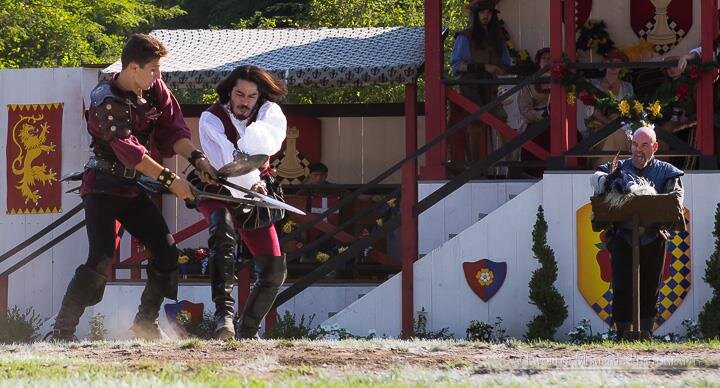I hail from North Jersey, where as a mere cherub, I began entertaining at the age of 3. It all started with Three Stooges routines in our family living room. My dad tried sports with me, but come on - I knew it wasn’t my thing because I knew I was much too fabulous for them! So, what does any other normal boy do? Join a theatre class! At age 9, I was introduced to the Merry World of Musical Theatre and did it simultaneously with my schooling. Some of my favorite and challenging roles were Edna (Hairspray), Horton (Seussical), Lord Farquaad (Shrek) and Jeff (Title Of Show).
A couple of years after graduating high school, my GSA (Gay Straight Alliance) advisor asked me to come in and chat with his club members! I planned out a pop-up performance and Q&A session. It was one of the best moments, as the kids really enjoyed what I presented! During the Q&A, one of the students asked me the infamous question, “What would you say to someone who wants to be an actor one day?” I froze for a second but then answered, “If you can see yourself doing ANYTHING other than acting, do that. It’s not an easy thing to break into, but if you cannot see yourself doing anything else but being a performer, do that.”
The summer after high school ended, I began professionally working in New York and was seen on CBS and E! News for my work in the Off-Broadway show Totally Tubular Time Machine starring Debbie Gibson. Then, I went along and created my debut solo cabaret show, “Very Gerry,” that played famous cabaret clubs like Don’t Tell Mama, Metropolitan Room and Paul Colby’s The Bitter End. Since then, I have hosted, starred in, and created many cabaret performances all over the country. In 2017 I conceived and co-starred in “The Golden Gays TM LLC,” a hilarious camp tribute to TV’s The Golden Girls and it was seen by thousands of people from all over the world! I created the troupe in June 2017 and concluded my almost 7 year run as “The Rose”, on December 9th 2023. Even though I am not a part of my creation anymore, I do think that “The Golden Gays” hit at the right time in my life. I think it was because of so many pop culture elements coming into one! With the success of RuPaul’s Drag Race and the nostalgia of The Golden Girls, it was kismet. I wrote a letter to Betty White during quarantine and told her that the role that she originated and created, got me my first NYC apartment. The timing was right and we had a great run. I am very thankful!
“I am a self-proclaimed Character Actor. An actor who usually plays older than they really are; male or female-presenting characters.”
Since the start of 2024, I have been building my venue connections, currently booking/touring my solo “Drag Bingo” and Impersonation show, “Divas in my Mind”, that pay homage to the ladies of Old Hollywood. I am also cultivating my new project for streaming services called “The Very Gerry Variety Hour.” It’s a love letter to Vaudeville and The Carol Burnett Show. I can be seen performing throughout Florida with Drag Events Unlimited, led by the national entertainer Nicole Halliwell. The works include tours of “Hocus Pocus Live” and “Stay Golden A Golden Girls Tribute Show.” Over 15 consecutive SOLD OUT shows nationally, that perform in regional sized theaters!
“Did you know that I once reminded someone of Madeline Kahn? It’s true and that was one of the best things that ever happened to me in my career!”
I have been very fortunate that some of my original works and tributes have been seen on CNN, Reelz, OK!, ABC, The New York Times, Disney, Celebrity Cruises, CBS, E! News, National conventions, ABC 7 Eyewitness News, and the Associated Press. Being a professional performer and working in the Theatre can be a very strange yet rewarding life. What I mean by that is the fact that one day you can be on top of the world, working every day; then down in the dumps and being unemployed for months and months. Since I really began with the lashes and heels in 2012, I have learned that the first thing you need is your health. Mental and physical. The second thing you need is your support system, whether it be family or chosen family. One cannot succeed in show business without a solid form of acceptance and support!
“Performing is my oxygen. I need to make people feel something!”
I never knew it would take zillions of gigs, 12 jobs, and $500 headshots every 5 years but I cannot see myself fighting for anything else. Every single day you have to play 10 different parts in the small business that is YOUR ACTING CAREER. Not all of us are as lucky as Beyonce! Bette Davis said, “Just do it. There’s never a shortcut in anybody’s business. It takes a lot of years to say “You’ve made it”. It takes 15-20 years
That’s why it’s so important to me to work with kind people and find other members of my tribe. I am forever blessed for the true people who’ve joined me on this ride. Special shout out and thank you to my crazy big beautiful Italian family and true friends for their constant acceptance and support!!! You have my heart.
Contact Info:
● Website: https://www.gerrymastrolia.com/
● Instagram: https://www.instagram.com/verygerrynyc/
● Facebook: https://www.facebook.com/verygerry94
● Youtube: https://www.youtube.com/user/MrGerryMastrolia

































